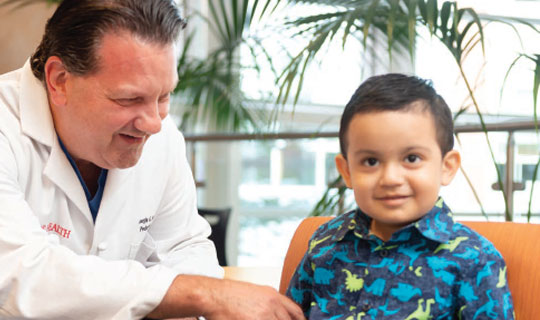“We found the right doctors and the right hospital. Ethan is finally living a normal life, thanks to his care at BMSCH.”

When Isabel Bermejo was three months pregnant, an ultrasound revealed that her fetus’s belly was enlarged. Her physicians in Ecuador, where Isabel and her husband, Hernan, lived at the time, suspected their child had Prune Belly Syndrome. In this rare condition, which affects about 1 in 40,000 births in the U.S., the child has poorly developed abdominal muscles, undescended testicles (in boys) and urinary tract malformations. The abdomen appears wrinkled, like the skin of a prune. Isabel and Hernan were told that their son was likely to die before he was born. Despite this devastating news, the couple held out hope for their unborn child. Six months later, Ethan was born.
Searching for the Best Care
Ethan was a happy baby aside from his medical problems, says Hernan. When he was 2 months old, he began to develop urinary tract infections (UTIs). At 6 months, he was diagnosed with pneumonia, a lung infection, and was treated with antibiotics. (Children with lax abdominal muscles are prone to lung infections because they have trouble coughing up secretions.)
Since Ethan had frequent UTIs, he had surgery in Ecuador at age 2 to correct his urinary tract and repair one of his kidneys. Later, when a team of American physicians from Doctors Without Borders came to Ecuador to assist with surgeries, Ethan had another procedure to move his undescended testicles from his abdomen into his scrotum.
In 2018, Ethan turned 3, and the family moved to the U.S. so the little boy would have access to better medical care. Despite taking antibiotics daily to prevent UTIs, he developed another infection and landed in the Pediatric Emergency Department (ED) at Robert Wood Johnson University Hospital (RWJUH). Isabel and Hernan, who live in East Windsor, learned Ethan’s infections had become resistant to the antibiotics he was taking.
The ED physicians referred the Bermejos to Joseph Barone, MD, Chief of Pediatric Urology at The Bristol-Myers Squibb Children’s Hospital (BMSCH) at RWJUH and Rutgers Robert Wood Johnson Medical School. After doing some research online, Isabel and Hernan discovered that BMSCH is one of the best hospitals in the U.S. for pediatric urinary problems.
During the appointment, Dr. Barone told the Bermejos that Ethan needed his abdominal wall repaired, which would lower his risk for both UTIs and lung infections. The surgery, which involved tightening the abdominal muscles and removing the extra skin in the middle of Ethan’s belly, would also be cosmetic.
Without muscles in the front of the abdomen, the skin and intestines bulge.
“Sometimes the belly is so big the child tips over,” says Dr. Barone. Ethan wore very large pants that fit poorly, and he had difficulty sitting down, crawling and walking due to the weight of his stomach.
“He would become tired when he walked and ran out of energy easily,” recalls Hernan.
A Successful Procedure
The Bermejos agreed to the surgery, which was done at BMSCH. Dr. Barone performed the procedure with Yi-Horng Lee, MD, in November 2018. The operation was a success.
Although Prune Belly Syndrome is rare, Dr. Barone estimates he has treated about 50 children with the condition.
“If a child is born with kidneys that are extremely dilated [swollen due to urine buildup], he or she tends to die shortly after birth from kidney failure,” he says.
“But those with decent renal function seem to do quite well,” says Dr. Barone.
“Ethan’s kidney function is surprisingly good for a child with Prune Belly.”
Ethan’s journey hasn’t been easy, but Hernan and Isabel are grateful for the positive outcome. Ethan stopped taking antibiotics a month after his surgery and hasn’t had another UTI. Today, he’s a typical 4-year-old. “He runs around like a normal kid,” says Hernan.
“He can play, ride a bike and go to the pool. It’s really wonderful. We found the right doctors and the right hospital. Ethan is finally living a normal life, thanks to his care at BMSCH.”
To learn more about pediatric urology at The Bristol-Myers Squibb Children's Hospital at Robert Wood Johnson University Hospital, visit www.rwjbh.org/bmschurology.